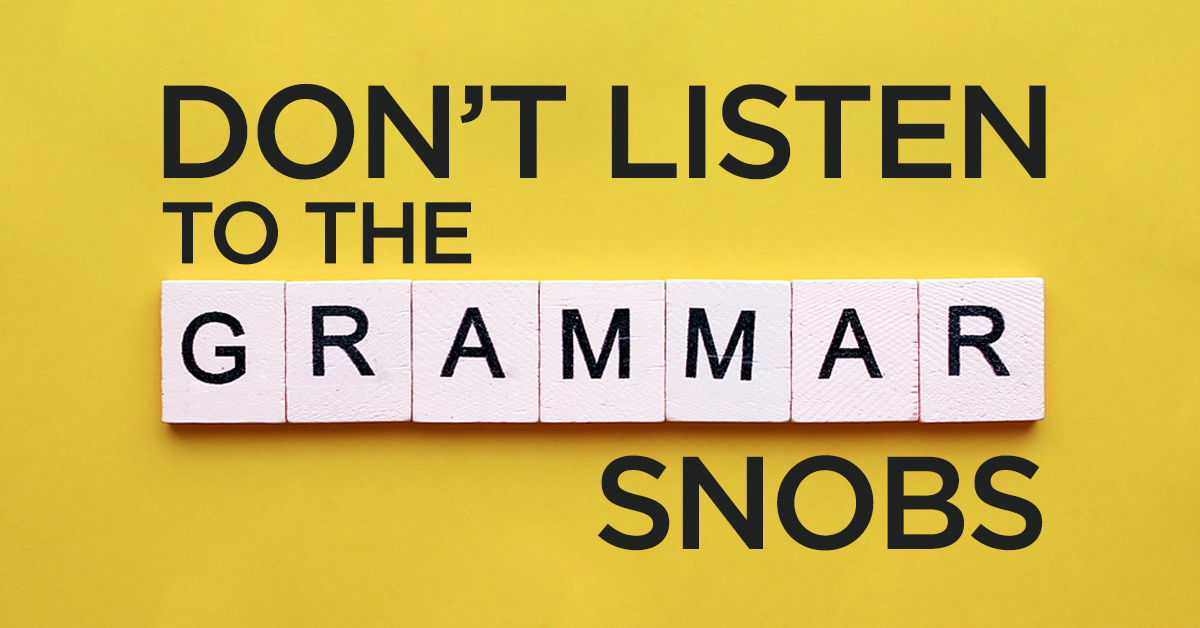
Mitch Glass
Table of Contents
Depend on your audience
Grammar matters in copywriting, but not the way you might think. The way you use grammar—whether “correctly” or incorrectly—will depend on your audience. You want to build trust and credibility. If you're writing for highly-educated senior citizens worried about their retirement investments, proper grammar might be a good idea. But if you're writing to a hip Gen Z audience, formal grammar might actually lose credibility.
Twisting grammar can work well
The Oxford comma and lack thereof has plenty of hard-core adherents on both sides. The general public doesn't care. Even those who choose one side or another (like me) don't get overly excited about its use or non-use.
There, they're & their. This one matters. In addition to the grammar Nazis (like me), the general public does know the difference. Enough people will also note a misuse to ridicule the incorrect usage so that it may become a viral meme. of course, going viral draws plenty of attention and even negative publicity is better than no publicity at all.
Slang like U, R, UR and etc. In formal copywriting, Internet slang should be avoided, unless it is used specifically to draw attention to the slang.
Deliberately twisting grammar can work well. In the 1980s, the burger chain Wendy's ran a jingle that went “Ain't no reason to go anyplace else.” The double negative and the “ain't” caused grammar Nazis to grate their teeth (didn't bother me) but the campaign was wildly successful for the burger chain.

Ben Baker

Ziev Beresh
Grammar matters
Grammar matters when you're writing for a professional industry or organization. Grammatical errors stand out as informal or incompetent in this context. Professional audiences in corporate or institutional industries expect correct grammar and plain writing.
Correct grammar doesn't matter as much when you're writing in an informal voice to an informal audience. Many brands write the way that people in their audience talk. This involves dropping correct grammar to keep the writing more casual and resonant.
Individuals and brands that project a more casual tone don't have to follow grammatical conventions. Their writing is often more effective when they don't follow grammar to a T.
The most fundamental of basics
One reason why I have issues with the new industry mantra that “data should dictate content” is the fact that so much of the data can be grammatically horrifying. Grammar is the beating heart of any language.
A writer needs to be the one that adheres to these principles as much as possible. While it’s easy to disregard this time-tested concept, it’s important to emphasize that if ignored it could lead to several other issues down the line. Ignoring grammar and accepting grammatically inaccurate keywords may drive up your traffic. But once the reader starts reading your [copy], it won’t leave a positive impact on their mind.
So why go down the road that only ends in disaster? My advice is simple: whatever you do, do not betray the basics. And grammar is the most fundamental of basics in any language.

Yasir Nawaz

Kristine Daub
Good grammar maketh the brand
When it comes to strong branding, be it personal or organizational, grammar speaks volumes.
Poor grammar sets an impression in the reader's mind that your brand is not capable of clearly communicating a message. If your brand cannot properly string together a few sentences, how should your audience expect to have anything else delivered adequately, including your service or product offering?
If I visit a brand's website with the intent to purchase, and grammatical errors are present, I immediately shop for a competitor who can communicate their value offering, grammatical-errors-free.
Make sure your content matches
Grammar in the online world matters much less than most people think it does. The key is to make sure your content matches the audience, but more importantly, the language. Medical or financial websites will need to have a higher expectation when it comes to grammar because most people will be looking at this content as an authority with inherent trust.
Websites that don't have the same expectation can get away with more grammar mistakes. The problem comes when websites employ non-native speakers to try and write their content. Audiences will be able to immediately identify these grammar mistakes and it becomes off-putting and creates friction in the process.

Raul Mercado

Brittany VanDerBill
Yes, grammar matters in content and copy. Until it doesn't.
If you're writing content for a doctor's website, then grammar absolutely matters. Nobody wants to trust their health to someone who doesn't know how to construct a proper sentence. If the doctor (or likely the doctor's staff) doesn't bother to proofread their own writing, can they be trusted with their patients' health concerns? It's a lot harder to trust someone who is supposed to be a professional when their website content is riddled with errors. On the other hand, grammar isn't as big of a deal for brands that have a more conversational brand voice and a service or product that isn't quite as life-or-death as healthcare can be. Conversational writing follows the rules of grammar for the most part. However, brands can have more fun with their writing style by throwing in some humor, including some slang, or skirting the rules of grammar by using incomplete sentences. The bottom line is that writers need to know their audience and the brand that's commissioning their [copy].
Know your grammar well
Is the Oxford comma really relevant in today’s world? More importantly, does it make a difference in a text that is written to be skimmed, scanned, scrolled up and down while the reader is commuting? The answer seems obvious. A dangling modifier also seems to have lost all traction in an era when the reader’s attention is dangling and floating in an open space until it gets hijacked by the next smartphone notification.
But that doesn’t mean we should burn our grammar textbooks and forget how important it is not to use “its” and “it’s” interchangeably. It’s up to you to opt for the Oxford comma or decide you can live without it. But if you decide to absolutely ignore grammar, it may easily turn back on you. We tend to forget the simple truth: grammar was not invented by evil academics who wished to come up with the next instrument to torture school kids. It rather developed quite naturally as a way of reining in all the local, social, and personal variations of our spoken language. Without it, your English-speaking readers from all over the world wouldn’t be able to understand this article completely. In other words, you must know your grammar well to be able to break some of its rules.

Stephanie Thompson

Jade Rowlatt
It matters a lot.
It’s what differentiates “Know your shit” from “Know you’re shit.”
Grammar isn’t so much of a fixed rulebook, but rather accepted conventions. There’s nothing stopping you from writing “I think your cool,” but you’ll probably get some confused looks. So grammar brings clarity to your writing. And with clarity comes meaning.
But does absolutely everything have to be by the book? No. Language is an ever-evolving thing. New words get added to the dictionary every year, and sentence structures change. And that’s the beauty of it. Imagine if we still spoke like Shakespeare? It’d take us forever to say anything.
I personally love starting a sentence with ‘and’ or ‘because’ – as you’ve seen – which is something I was always taught not to do at school. So we can manipulate our grammar to a degree, as long as it still makes sense and reads well, but there still needs to be that baseline where we get the fundamentals right. Otherwise, it’d just be chaos.
If writing is art, grammar is the medium.
If writing is one’s trade, improper grammar is no more appropriate for a professional writer than it is for a plumber to forget which end of a wrench to use. Like that hypothetical wrench, words are the tools of the writer’s trade. As such, mastery of grammar is crucial not only to adequately convey thoughts and ideas but also because a writer who fails at grammar has already lost credibility and, as a result, their audience.
If writing is art, grammar is the medium. Barring a very few circumstances, poor grammar diminishes the musicality, or flow of the written word, and takes away from its impact. Either way, good writing with bad grammar is a nearly impossible trick to pull off. It is much easier, in fact, to just learn the rules before trying to break them or worse, disregard them.

Russell Michelson
This is a crowdsourced article. Contributors are not necessarily affiliated with this website and their statements do not necessarily reflect the opinion of this website, other people, businesses, or other contributors.




0 Comments